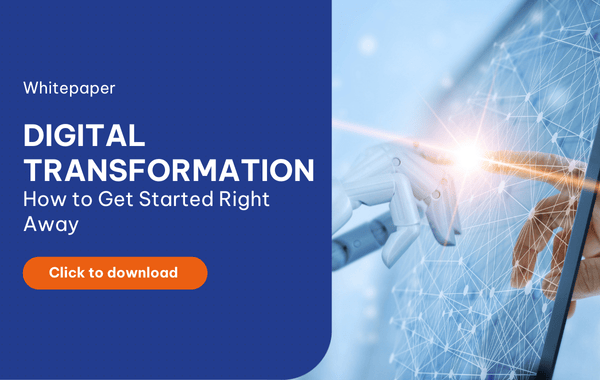Digital transformation refers to the implementation and utilisation of digital technologies in the business to achieve a competitive edge. Those benefits include greater efficiency for the stakeholders, stronger business agility, and many more. Many industries are taking advantage of this digital transformation agenda, and the Hospitality Industry is no exception.
Read more: The New Face of Hospitality: Creating a Contactless Guest Experience
Contents
- What is digital transformation in the Hospitality industry?
- Key technology trends in the Hospitality industry
- What are the advantages of this transformation?
- The future of digital technology in the Hospitality industry

What is digital transformation in the Hospitality industry?
Technologies are continuously improving and have been transforming how hoteliers manage their properties and staff ultimately enhancing the guest service experience.
Adopting the technology can help enhance and speed up internal operations, device connectivity, communication, and data analysis. By doing so, management and staff can leverage cutting-edge hospitality services, stay up to date with the trends in the market, and therefore be able to modify their business and marketing strategies accordingly.
Read more: Modern Solutions that Empower Hotels to Overcome Challenges Today
Key technology trends in the Hospitality industry
1. Mobile-first and the Internet of Things (IoT)
Hotel chains are starting to implement the Internet of Things to further improve the guest experience, such as automated check-in and check-out, mobile key card integration, customising hotel rooms, and many more.
The mobile integration allows guests to download the hotel’s mobile app to their smartphones or tablets to submit requests, seek travelling advice, and research information.
The mobile app can also be integrated with other hotel services, one of the most important being the restaurant. The food ordering system allows guests to order and pay from their devices.
Read more: Hotels in a Cloud-first, Mobile-first World
The benefits of using IoT in hotels:
- Convenience – The hotel staff can address guests’ needs more quickly.
- Ease of access to information – Guests do not have to rely on staff for information as all are available and easily accessible right at their fingertips.
- Improved communication – The app can help shorten the time taken for guests to communicate with the staff.
2. Facial recognition systems
Many hotels are implementing facial recognition systems as part of their services. This technology allows guests to easily and securely check-in/out, enter their rooms, and enter public facilities in the hotel without the need for a physical key, digital device, or fingerprint.
The benefits of using facial recognition systems:
- Security – This system ensures security as you may only enter the space with the registered face, preventing strangers from accessing the hotel area.
- Efficiency – Reduces guests’ time checking in or entering other facilities/ areas within the hotel.
- Avoid losing hotel card keys and minimise the use of plastic from plastic hotel cards.
- Ease the burden on the staff.
3. Virtual Reality (VR)/ Augmented Reality (AR) technology
It is the greatest innovation that enables guests to take a quick look at the property without the need to leave their house.
The hotel can utilise VR/AR to enhance the travelling experience of their future and current guests on the hotel’s property by immersing them in a virtual/ augmented reality and showcasing the hotel property and facilities.
The technology can be of great use for guests travelling from another area or country, as it could ensure their familiarity with the hotel’s property and enable them to check out the surrounding areas before their visit.
Read more: Winning the Guest in the Age of Hospitality Personalisation
The benefits of using VR/AR technology:
- Offer unique experiences well before guests step foot in the hotel.
- Display realistic 360-degree images of the property and showcase the facilities and ambience they offer.
- Provide an exact visualisation of the different room settings available.
4. Artificial Intelligence (AI) technology
Artificial Intelligence can be utilised to automate redundant tasks and free up staff to focus on providing customised and better assistance to guests.
There are countless AI applications available on the market today. Hoteliers can leverage well-developed solutions, such as AI chatbots and virtual assistance, to analyse big data, streamline various processes from lighting to temperature and security, and more.
It can also be utilised to improve the marketing side of the business, for instance, by using push notifications to distribute personalised promotions and messages to all staying guests based on their preferences and other factors. This system could also predict the demand and supply of customers over a while.
Read more: 3 Ways A.I. is Providing Personalised Experience to Hotel Guests
The benefits of using AI technology:
- Improve efficiency in the hotel by automating repetitive and redundant tasks.
- Enhanced guest experience through customised service.
- Reduce cost for the redundant processes and free up staff’s workload for more critical tasks.
5. Data analytics tools
Digital transformation is a must for the hotel industry, and data plays an essential role in accomplishing this process. Hotels have an abundant amount of customer data, which can be mined, analysed, and utilised to determine what aspects of their business need to be improved.
Hoteliers can not rely solely on their gut feelings. The traditional methods of analysing performance data and making decisions are resource-intensive, error-prone, and do not provide hoteliers with timely information to make effective decisions.
Hoteliers need a tool that enables them to stay proactive and respond fast enough in today’s highly dynamic environment. They need advanced data analytics solutions that provide them with tools to do more than just analyse data—they need tools for visualising, highlighting trends, role-based dashboarding, what-if building, etc.
Read more: OLAP Technology: Handling Big Data in the Hotel Industry
The benefits of using data analytics tools:
- Help hoteliers make more informed decisions based on real-time insights.
- Grasp not only relevant insights but also its underlying data to streamline financial planning.
- Form a basis for decision-making and quality improvements.
- Target the right customers and thus avoid wasteful campaigns.
What are the advantages of this transformation?
When there are different ways for customers to talk to the most appealing brand, they can actively get the information they need. As information is readily available on many platforms, customers can read it in their own time.
They can also compare the fee and promotion and read feedback from others about the particular hotel before making their final decision. Finally, booking a room and making payments are also completed online in minutes.
Read more: 9 Ways to Increase Hotel Profits
Hotels also benefit from digital transformation projects. Businesses in this industry have applied more mobile solutions to the reservation, payment, and service request processes, etc., to improve the customer experience.
Many hospitality brands agree that digital transformation is key to staying ahead of their competitors. Here are the reasons:
Reduce the waiting time
In today's fast-paced world, where time is of the essence, hotels that prioritise reducing waiting time through self-check-in and guidance demonstrate their commitment to providing exceptional service and meeting the evolving needs of their guests.
With the advancement of technology, hotels can provide options where guests can complete the check-in process on their own using kiosks or mobile apps. This eliminates the need to wait in long queues at the front desk, allowing guests to quickly access their rooms and start enjoying their stay.
Not only does this reduce waiting time, but it also enhances the overall guest experience. Guests appreciate the convenience and efficiency of self-check-in, as it gives them more control over their check-in process. They can complete the necessary steps at their own pace without feeling rushed or delayed by other guests.
Read more: The New Face of Hospitality: Creating a Contactless Guest Experience
In addition, self-check-in systems can be integrated with digital room keys, allowing guests to bypass the front desk altogether and directly access their rooms using their smartphones. Together, they create a positive first impression and set the tone for the rest of the guest's stay.
Increase communication flow
Hotels today have a plethora of communication channels at their disposal to connect with their guests. Social media platforms such as Facebook and Instagram, as well as email and other messaging services, have become vital tools for hotels to engage with their guests and provide them with timely, relevant updates, promotions, and personalised offers.
Utilising these communication channels allows hotels to easily reach out and address any concerns or inquiries they may have. Furthermore, in the event of a media crisis or negative publicity, hotel managers can use these platforms to take control of the narrative and address any concerns or misconceptions directly.
In addition to maintaining a strong online presence, hotels can also leverage these communication channels to gather feedback and insights from their guests. Through surveys, online reviews, and social media interactions, they can gain valuable information about their guests' preferences, tastes, and overall satisfaction. This data can then be used to further tailor their services.
Read more: How Infor SunSystems Hospitality Empowers Hotel Businesses
Reduce the carbon footprint
Hotels are increasingly adopting sustainable practices to reduce their carbon footprint. One effective way to achieve this is by eliminating the need for printing paper forms and key cards and encouraging guests to install a mobile app.
This unique advantage aligns perfectly with the growing trend towards a greener lifestyle. Guests are increasingly aware of the impact of their choices on the planet and appreciate hotels that share their values.
Furthermore, digital solutions offer the added benefit of convenience and efficiency for guests, as we have stated above.
In addition to reducing the carbon footprint, digital solutions also enable hotels to gather guest data (with their consent, of course) through the hotel's mobile app, thus feeding more insights into curating hyper-personalised campaigns.
Read more: Why Sustainability Is Important in Hospitality and the Best Practices
Raise brand awareness and improve performance
Most leads and potential customers rely heavily on the reviews left by other customers on platforms such as Google, Facebook, and TripAdvisor. These reviews provide valuable insights into the quality of service and overall experience that a hotel offers.
As a hotelier, it is crucial to take advantage of these online reviews and use them to your advantage. Positive reviews can be a powerful tool for attracting new customers and building brand credibility. They serve as social proof, assuring potential guests that others have had a positive experience at your hotel.
However, negative reviews should not be disregarded or ignored. In fact, they present an opportunity for you to rectify any issues and improve customer satisfaction. When a guest leaves a negative review, it is essential to respond promptly and honestly. Address their concerns and offer a solution or explanation. This shows that hotels value their feedback and are committed to resolving any issues that may have arisen. This can help build trust and credibility for your hotel.
At the end of the day, the key point is to be receptive to both positive and negative feedback. Embrace the opportunity to learn and grow from customer reviews, and use them to continuously improve the hotel's performance.
The future of digital technology in the Hospitality industry
Technology will continue to evolve. Today, more innovations and emerging technologies are being implemented in the Hospitality industry than ever. It is expected that businesses will continue to adopt more modern solutions within the next few years to gain a competitive advantage.
If the pandemic has taught businesses anything, it is that digital transformation is the future. Technology, together with leadership, vision, and company culture, creates a solid foundation for business continuity in a world full of uncertainty and volatility.
For hotel organisations, digital transformation will bring significant benefits as well as tremendous improvements to the guest service experience. Hotels should not feel reluctant or against innovative solutions that can help them optimise operations and discover new opportunities.
 English
English  Vietnamese
Vietnamese 



